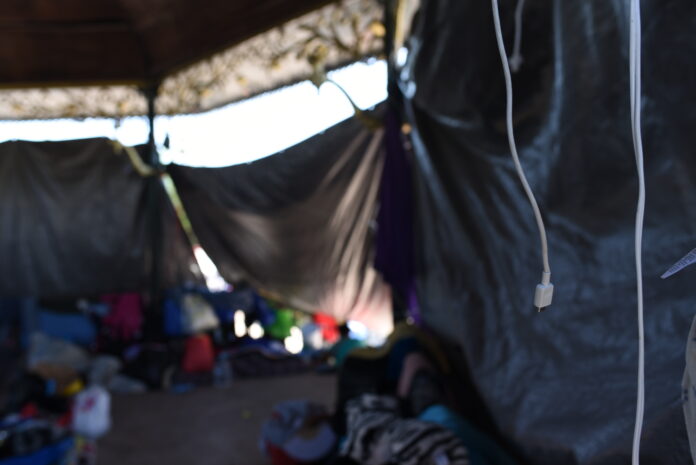More than 2,500 migrants living at an encampment in Reynosa a block away from the international bridge no longer have electricity — an act that’s prompting concerns over food, communication, transportation and sexual assault.
“It was their sense of protection,” Pastor Hector Silva, the director at the migrant shelter, Senda de Vida, said Thursday of the electricity at Plaza las Americas where the encampment is located.
A city leader met with churches, and U.S. and Mexican nongovernmental organizations, like the Sidewalk School and Senda de Vida, Thursday morning to discuss the changes to the site.
The plaza became a waiting room, of sorts, since April when donated tarps pieced together with nylon rope, camping tents, blankets and benches were turned into beds by migrants expelled from the U.S. under a public health policy known as Title 42.
Men, women, and children from countries like El Salvador, Guatemala, Honduras, and most recently Haiti, wait there to seek asylum in the U.S. when the policy barring them from doing so is lifted, while others wait as they gather enough money to make the trip back home.
Tensions at the encampment increased when a late-night law enforcement operation left the migrants bereft of propane tanks used to cook food at the site back in Aug. 19. Many worried other basic needs, like electricity and water, would be stripped away that weekend, but the changes wouldn’t come until Wednesday, over a month later.
Electricity from the kitchens set up at the encampment was taken away earlier this week, but Felicia Rangel-Samponaro, co-founder of the Sidewalk School, said migrants were still charging their phones through Tuesday. By Wednesday, the power was completely shut down.
“It is the city,” Rangel-Samponaro confirmed. It was a decision made by a municipal office, Protección Civil.
“It makes everything a lot more dangerous as if it wasn’t already dangerous enough,” Rangel-Samponaro said.
Reports of sexual assault on young girls at the encampment reached Pastor Hector Silva, who allows migrant families living at the plaza to move into Senda de Vida when room is available.
Silva called the city’s action to cut the electricity “inhumane” but said it may have been related to rising expenses. He is concerned the assaults that happened during the time when electricity was running will worsen without it.
“They’re closing the doors to the girls living at the plaza,” Silva said.
Rangel-Samponaro believes water will be next. The Sidewalk School might help with water then; but, for now, the organization gave money to help buy generators that could be placed at the plaza.
Volunteers helping migrants move into shelters or driving them to hospitals are facing greater scrutiny from officials enforcing federal laws that keep them from transporting migrants who do not have legal authorization to be in Mexico.
Rangel-Samponaro, who’s been helping in Reynosa since April, noticed the shift about a month ago when Mexico started enforcing immigration laws on its southern border, in some cases with brutal force.
State police, Mexico’s national guard, and city officials have warned the Sidewalk School co-founders against transporting migrants not authorized to be in Mexico and have even threatened arrests.
The threat was clear in mid-September when a group of National Guard officers surrounded Rangel-Samponaro as she drove a group of Haitians through Tamaulipas.
Even trips to help migrants with medical emergencies are also at peril.
Some of the migrants staying at Senda de Vida are pregnant or have severe medical problems.
Ambulances will not respond to migrants who are sick, Silva and Rangel-Samponaro both said. During the day, organizations like the Global Response Management and Doctors Without Borders will provide medical attention at the encampment and at the two migrant shelters in Reynosa.
At night, medical attention is scarce or outright denied.
During the week, Silva said the shelter took a woman with cancer and in pain to the hospital. Staff inquired about her immigration status and used the information to deny her services. Silva said they said staff told the woman they would be calling immigration. The woman, scared to be deported, fled from the hospital and called the shelter to pick her up.
A driver was sent to pick her up, and although it is a violation of the federal law, Silva said it falls under their charge.
“Our responsibility is to help people who need our help,” Silva said.
Senda de Vida has not been safe from the city’s heightened scrutiny. In July, the city threatened to demolish the 17-year-old building where the migrant shelter is working to expand. Silva said their lawyers are still keeping an eye on the legal proceedings to ensure they do not lose their site.
A larger plan in the meantime continues to take form to move the encampment away from the international bridge.
Thursday’s meeting included discussion over new sites that could be used to house migrants, but it will be a costly venture.
One site will need the construction of a concrete wall, showers, bathrooms and an underground water tank.
“That’s going to take a lot of money, and it won’t just be the Sidewalk School on its own,” Rangel-Samponaro said Thursday.
On Friday, the Good Neighbor Settlement House, a Brownsville nongovernmental organization, agreed to collaborate with the Sidewalk School on the new encampment project, according to Rangel-Samponaro.
The plans have fluctuated for months, but Rangel-Samponaro believes the city’s recent actions will quicken the construction plans.




